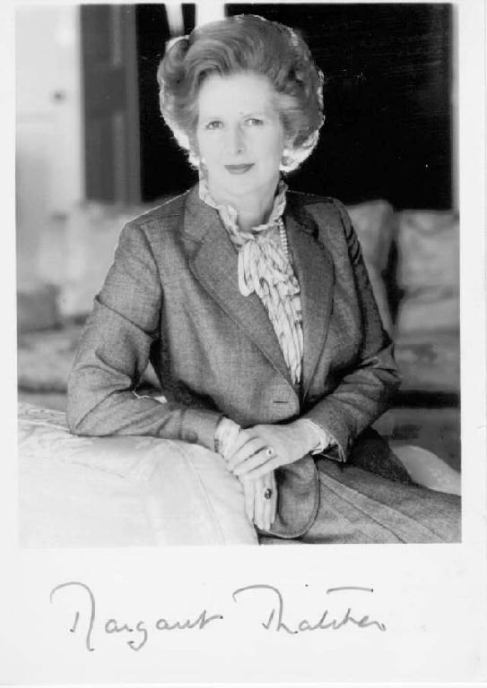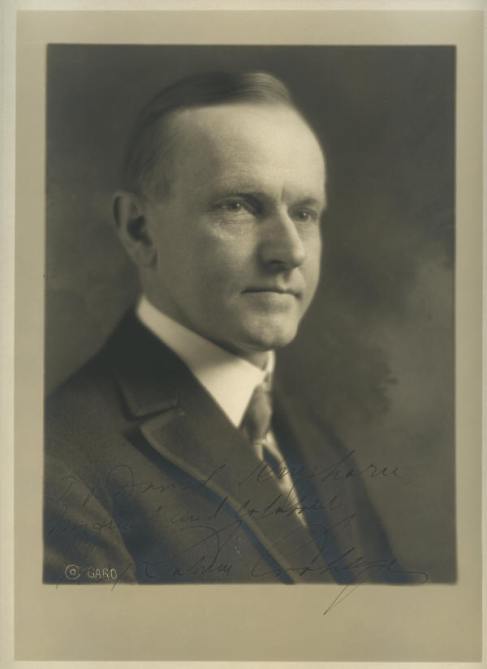As today marks the passing of Baroness Margaret Thatcher, the “Iron Lady,” who served as Britain’s Prime Minister from 1979 to 1990, it is necessary to remember that her convictions were not new. They were shared by none other than Americans like President Coolidge. Thatcher was born in a relatively small market town called Grantham in England, in the second year of Coolidge’s presidency, during the same fall that his secretary, C. Bascom Slemp, was preparing a collection of his speeches, which would be published the next year as “The Mind of the President.” In that collection, Coolidge would express an unshakable optimism in the ability of Americans to govern themselves, saying, “The institutions of our country rest upon faith in the people. No decision that the people have made in any great crisis has ever shown that faith in them has been misplaced. It is impossible to divorce that faith which we have in others from the faith which we have in ourselves.”
Perhaps entirely unaware of these words, Prime Minister Thatcher would echo that same confidence in her people to retain their self-sufficiency, “If our people feel that they are part of a great nation and they are prepared to will the means to keep it great, a great nation we shall be, and shall remain.” She would affirm in the same 1980 speech, “[I]t is not the State that creates a healthy society. When the State grows too powerful people feel that they count for less and less. The State drains society, not only of its wealth but of initiative, of energy, the will to improve and innovate as well as to preserve what is best. Our aim is to let people feel that they count for more and more. If we cannot trust the deepest instincts of our people we should not be in politics at all. Some aspects of our present society really do offend those instincts. Decent people do want to do a proper job at work, not to be restrained or intimidated from giving value for money. They believe that honesty should be respected, not derided. They see crime and violence as a threat not just to society but to their own orderly way of life. They want to be allowed to bring up their children in these beliefs, without the fear that their efforts will be daily frustrated in the name of progress or free expression.”
Coolidge in 1914, as Thatcher’s father was going to war, would praise self-sufficiency and warn against the destructive actions of government activity, “The people cannot look to legislation generally for success. Industry, thrift, character, are not conferred by act or resolve. Government cannot relieve from toil. It can provide no substitute for the rewards of service. It can, of course, care for the defective and recognize distinguished merit. The normal must care for themselves. Self-government means self-support.”
Thatcher would again sound familiarly Coolidge-like in a 1987 interview, when she observed, “I think we have gone through a period when too many children and people have been given to understand ‘I have a problem, it is the government’s job to cope with it!’ or ‘I have a problem, I will go and get a grant to cope with it!’; ‘I am homeless, the government must house me!’ and so they are casting their problems on society and who is society?
“There is no such thing! There are individual men and women and there are families, and no government can do anything except through people and people look to themselves first.
“It is our duty to look after ourselves and then also to help look after our neighbour and life is a reciprocal business and people have got the entitlements too much in mind without the obligations.”
Coolidge, in retirement, would presage the danger of the entitlement mindset and its parent, unrestrained government spending, “This country was not made on the theory that we should ‘eat, drink, and be merry, for tomorrow we die’…Instead of falling back and falling down on the claim that the world owed them a living, they moved forward and moved up on the principle that they owed the world the duty of providing for themselves…One of the most astounding spectacles is the complacency with which people permit themselves to be plundered by extravagant governmental expenditure under the pretense of taxing the rich to help the poor. The poor are not helped but hurt…A higher tax means real wages are lower. The cost of living is higher. The chance to work is less. Every home is burdened. Its value is decreased. The Congress and the legislatures know these results of extravagance…Those who demand appropriations inspire all the fear. Aggregate state and town debt, national and local taxes are increasing enormously. Unless the people resist vigorously and immediately they will be overwhelmed.”
Speaking again, forty-nine years later, Thatcher explained the same harmful mentality underway in Britain, namely, “to add to public spending takes away the very money and resources that industry needs to stay in business let alone to expand. Higher public spending, far from curing unemployment, can be the very vehicle that loses jobs and causes bankruptcies in trade and commerce. That is why we warned local authorities that since rates are frequently the biggest tax that industry now faces, increases in them can cripple local businesses. Councils must, therefore, learn to cut costs in the same way that companies have to.”
Baroness Thatcher is no longer with us but her principles endure. They remain necessary no less now than in 1980 or in 1925. They are necessary because they truly understand human nature and are grounded in the moral responsibilities of people both to themselves and to each other. For Coolidge, in the same year Thatcher was born, declared, “I favor the policy of economy, not because I wish to save money, but because I wish to save people. The men and women of this country who toil are the ones who bear the cost of the Government. Every dollar that we carelessly waste means that their life will be so much the more meager. Every dollar that we prudently save means that their life will be so much the more abundant…If extravagance were not reflected in taxation, and through taxation both directly and indirectly injuriously affecting the people, it would not be of so much consequence. The wisest and soundest method of solving our tax problem is through economy…Whenever taxes become burdensome a remedy can be applied by the people; but if they do not act for themselves, no one can be very successful in acting for them.”
Such is the benefit coupled with the responsibility of self-government taught by British Prime Minister Thatcher and the American who preceded her, President Calvin Coolidge.

